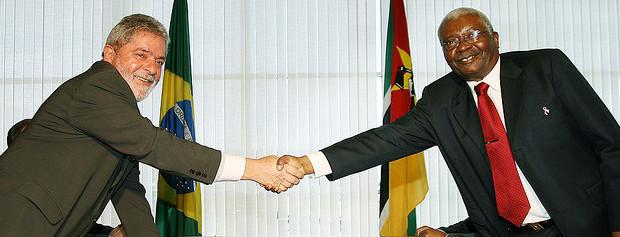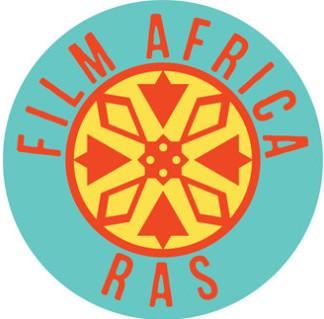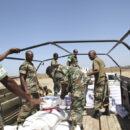Mozambique: Academic and journalist in the dock over Facebook post

A Mozambican academic and editor faced trial for allegedly libelling former president Guebuza. The prosecution did not present a single witness.

Former President Armando Guebuza (right) meeting Brazil’s former President Lula. Photograph by Gustavo Ferreira/ MRE.
Prominent Mozambican economist Carlos Nuno Castel-Branco on Monday told a Maputo court that a Facebook post he wrote in November 2013 was intended as part of a political debate on the problems the country faced, and not an attack on the honour and dignity of the then president, Armando Guebuza.
Castel-Branco is on trial before the KaMpfumo urban district court for supposedly libelling Guebuza in his Facebook post. Since libelling senior political figures is classified as a crime against state security, it is not Guebuza himself who brought the case, but the Public Prosecutor’s Office.
Fernando Mbanze, editor of the independent newssheet Mediafax, is in the dock alongside Castel-Branco. He had republished the Facebook post, and now finds himself accused of the crime of “abuse of press freedom”.
Guebuza has made no comment on the case, and there is no indication that the prosecutors even questioned him.
The prosecution claims that various of the statements made by Castel-Branco in his post were untrue, including his opening line “Mr. President, you are out of control”.
It also did not like the claim that Guebuza had surrounded himself with “boot-lickers”, or that he had repeatedly insulted “those who have ideas about national problems, rather than creating opportunities to benefit from their experience and knowledge”.
The prosecution claims, in a wilful misreading of the post, that Castel-Branco had compared Guebuza to fascist dictators. In fact, the post warned, not that Guebuza was a fascist, but that his governance might pave the way for fascism.
The politico-military crisis of 2013, Castel-Branco wrote, “makes us remember the preludes to fascism. In similar situations, Hitler, Mussolini, Salazar, Franco and Pinochet were installed in power, and were defended by big capital as long as they defended the interests of big capital”.
“I did not compare the former president to fascists”, Castel-Branco told the court. “But the processes in Mozambique are similar to the processes leading up to fascist dictatorships”.
As for saying that there bootlickers around Guebuza, he pointed out that many others had made similar claims – including senior figures in the ruling Frelimo Party, such as the former head of the Frelimo ideology department, Jorge Rebelo.
Castel-Branco was once close to Guebuza. In 1977, when he was just 17 years old, he joined the revolutionary armed forces (FPLM), and was placed in the FPLM political commissariat, which was headed by Guebuza. Three years later, it was Guebuza who ensured that Castel-Branco went to university.
At the time, they shared a common ideology – both defined themselves as socialists and as Marxist-Leninists. Asked what had changed since then, Castel-Branco, citing former Greek finance minister Yanis Varoufakis, replied “I didn’t change – the boat changed its direction”.
As for the publication of his Facebook post in the Mozambican media, the academic said that he had neither authorised it nor denied permission for it to be republished. “I am not going to exercise censorship against the Mozambican press,” he said.
Mediafax editor Mbanze told the court that the post had been discussed in the newsroom, and that the journalists had agreed it was part of an important debate of ideas and was therefore worth publishing. No-one in Mediafax had construed it as libellous or insulting.
“Had we concluded it was libellous, we wouldn’t have published it,” said Mbanze.
“Since it is debatable, it ought to be debated”
It is strange that the case has come to trial at all. After all, last year, the Mozambican parliament passed a law giving amnesty to security offences “of any nature” committed between March 2012 and August 2014. Clearly, this ought to cover a Facebook post made in November 2013.
The prosecution has not explained how it can override words as categorical as “of any nature”. But Castel-Branco and Mbanze deliberately chose not to base their defence on the amnesty law. Instead, they argued that the post was a legitimate part of a national debate.
Castel-Branco’s lawyer, Joao Carlos Trindade (who is a retired Supreme Court judge), said his client was not invoking the amnesty law, “because he prefers to be acquitted, since no crime was committed. Accepting an amnesty would be to accept that he committed a crime”.
Trindade regarded this trial as a litmus test. “What is at stake is whether we live in a democracy or in a dictatorship where people are gagged and cannot express their views.”
“As a court, we have to tell the world what sort of country we are living in,” he said. “In no democratic country is someone condemned for criticising the way the President is ruling”.
Presidents should be prepared for scrutiny by the public, he added. “They have duties towards citizens, and citizens have to be vigilant to ensure that they are not defrauded”.
Trindade quoted sociologist Elisio Macamo, a well-known supporter of Guebuza, who in December 2013 had declared his shock at the decision to prosecute Castel-Branco and Mbanze. “I am astounded by this”, Macamo had written. “What kind of country do some people want to build. As a fan of Guebuza, I can’t believe he is behind this”.
Macamo did not agree with all Castel-Branco had said. “The content of this text is debatable”, he wrote. “But since it is debatable, it ought to be debated”.
The defence produced several witnesses, including a former deputy chairperson of the Mozambican parliament, and later head of the government’s Legal Reform Technical Unit (UTREL), Abdul Carimo, and former deputy agriculture minister Joao Carrilho. It cannot plausibly be claimed that these men are opposed to Frelimo or the government, yet they, and every other witness, saw nothing libellous or insulting in the Castel-Branco post.
“I don’t see any intention to offend the dignity and honour of Armando Guebuza”, said Carimo. “The article is a cry from the heart. It has a lot of adjectives, but there’s no attempt to offend”.
The prosecution, on the other hand, did not present a single witness. It brought forward nobody who claimed to have been scandalised by the article.
Presiding judge Joao Guilherme announced that the panel of three judges will give their verdict on 16 September. The delay of more than a fortnight was due to pressure of other work, he said.
Paul Fauvet is the editor of the English service at the Agíªncia de Informaí§í£o de Moí§ambique (AIM).
This article was originally published by AIM.





